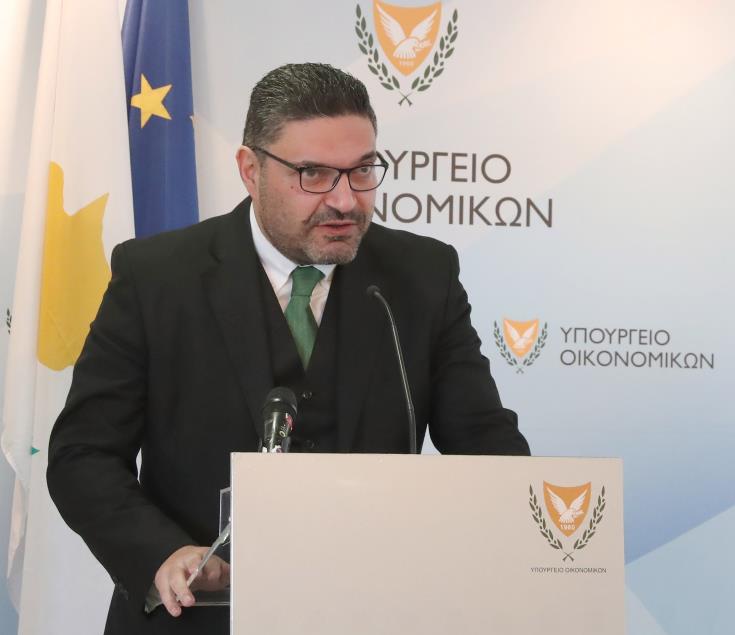Finance Minister Constantinos Petrides has warned opposition parties not to start “making noises” about Germany seeking a VAT exemption on a new consumer levy on energy consumption, saying it was not the same thing they had proposed in Cyprus although main opposition party Akel quickly accused him of “twisting the facts”.
President Nicos Anastasiades recently refused to sign off on and sent back to parliament two bills passed by the House relating to VAT on electricity and fuel. Acting on advice from the attorney-general, the president said the bills violated various articles of the constitution.
One – tabled by main opposition Akel – provided for zero VAT on fuel products until the end of the year. The government estimated a loss to state coffers of around €30 million. The other bill – co-sponsored by Diko and Dipa – would likewise have cut to zero the VAT levied on electricity invoices until the end of the year. The loss in state revenues from this was estimated at €45 million.
Anastasiades said they violate the principle of separation of powers – namely that the legislature has no authority to intervene with the state’s fiscal policy.
Parliament doubled down on the issue, and it will now go to the Supreme Court.
Berlin in the meantime is awaiting a response from Brussels on a VAT exemption for a new levy on consumers that is expected to cost German households almost €500 more a year for gas after the fee was set to help utilities cover the cost of replacing Russian supplies.
Trading Hub Europe, the German gas market operator, said on Monday it had set the charge at 2.419 euro cents per kilowatt hour (kWH).
The European Energy Exchange AG, Europe’s benchmark power price, surged past the €500 per megawatt-hour mark for the first time, ratcheting up pressure on households and businesses. That’s roughly a gain of roughly 500 per cent in the past year, Bloomberg reported.
“It is from these additional fees that the German government, being aware of EU legislation, requests an exemption from the payment of VAT,” said Petrides.
The new levy in Germany, he explained, is intended to help natural gas importers there so that “they can cope with the massively increased prices of natural gas they import from countries other than Russia.”
Petrides said the two situations are dissimilar. In effect, he was pointing out that opposition parties here are disingenuously conflating the two situations so as to argue that their two bills should not have been vetoed by the president.
The request of the German government is unrelated to the opposition’s proposals for not imposing VAT on consumption or on the fuel adjustment clause in EAC tariffs. On the contrary, the minister said, the German government does impose VAT on consumption and on the final price in accordance with EU legislation.
“I hope that the noises from opposition politicians will not push the government to impose new fees without VAT to support natural gas importers that we do not have,” Petrides noted with a dose of sarcasm.
He said the Cyprus government has not only not imposed additional fees or other taxes on consumers but has taken a raft of measures to safeguard households’ disposable income in the face of rising energy prices.
These steps included slashing VAT on electricity bills from 19 to 9 per cent for all households, and from 19 to 5 per cent for households designated as vulnerable.
The minister also said that Cyprus maintains a very low VAT rate and lower fuel consumption taxes compared to Germany and other EU countries, “while unlike other European countries the government does not intend to impose additional taxes or fees on consumers.
“On the contrary, it is proven that our policies during this difficult period are aimed at supporting society, with a priority for our vulnerable fellow citizens, with a relative budgetary cost of more than €350 million to date.
“The German government, rightly before proceeding with the determination of the new fee, has requested an exemption from the EU, which demonstrates beyond any doubt the incompatibility of the legislative proposals passed by the parliament with EU law and with our own Constitution,” he concluded.
But Akel’s Eleni Mavrou said Petrides’ remarks “twist the facts” and in fact prove their own point – that the German government’s request shows precisely that national governments can and do seek exemptions from the European Commission regarding taxation matters – something which Nicosia is unwilling to do.
“Whenever they [the government] are not hiding behind EU law, they either embellish the situation (for example the finance minster’s statement of March 3 that the “phenomenon is transitory”) or else they invoke the fiscal cost [of relief measures], and this at a time when the state already has increased revenues of €690 million from the rise in prices,” the statement read.
“They also stubbornly refuse to discuss Akel’s proposal to tax energy companies’ windfall profits, deferring the discussion to the beginning of 2023. We predict that the finance minister will continue to look for excuses.”







Click here to change your cookie preferences